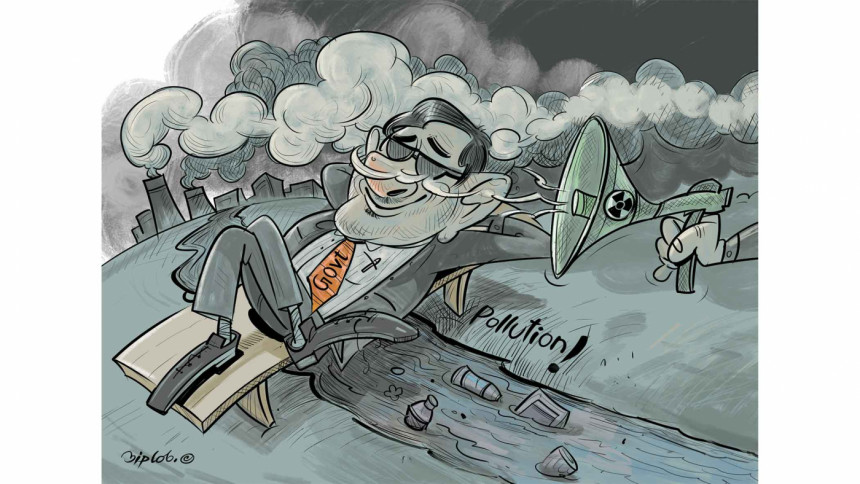Dhaka’s desperate need for fresh air
This weekend, Dhaka was crowned with the title of one of the unhealthiest air qualities on the planet Earth. With an AQI score of 236 and PM2.5 levels 32 times higher than WHO guidelines, the city's air is not just polluted; it is poison wrapped in the guise of urban progress. Yet, the severity of this crisis seems to hang, much like the smog, in an atmosphere of apathy. Dhaka's descent into hazardous air quality has been decades in the making, fuelled by unchecked industrialisation, reckless urban sprawl, and a systemic failure to prioritise public health. What's most alarming, however, is not the severity of the problem but the sheer inertia in addressing it.
Let us start with the brick kilns, or silent assassins of Dhaka's air. They line the city's outskirts, belching smoke day and night, contributing nearly 58 percent of its particulate matter. For years, the government has mandated the adoption of cleaner technology like zigzag kilns, yet enforcement has been as flimsy as a stack of poorly fired bricks. Bangladesh can no longer afford half-measures. What if every illegal kiln were shut down within six months? What if subsidies were provided for modernising these operations, paired with stringent penalties for noncompliance? The technology exists, as do the success stories—India's rapid shift to cleaner kiln technologies serves as proof.
Vehicles present the next gaping hole in our air quality management. Dhaka's streets are a playground for outdated, poorly maintained cars and diesel-run buses, all spewing black plumes of death into the atmosphere. Take Singapore, a city that once faced similar vehicular chaos. They enforced strict emission standards, introduced congestion pricing, and heavily subsidised public transport. A policy that incentivises electric vehicles and phases out old, polluting ones is no longer a luxury; it is a necessity. This is not about becoming Singapore—it is about realising that clean air is not negotiable.
Then there's construction dust, an ever-present irritant that exacerbates an already dire situation. Any glance at a construction site in Dhaka tells the story: debris flying in every direction, no covers in sight, and zero accountability. Cities like Tokyo have tackled this by enforcing rigorous site regulations—requiring barriers, water sprays, and fines for noncompliance. Dhaka's construction industry must operate with the same discipline, because no skyscraper is worth the respiratory health of millions.
But let's not reduce this to a list of policies. Air pollution is not a technical challenge alone; it is a political and social one. In Dhaka, public health has long been relegated to the back burner, overshadowed by economic imperatives. This mindset must change. Air pollution costs Bangladesh nearly 4.4 percent of its GDP annually. What if we reframed this conversation—not as an environmental crisis but as an economic one?
China, once infamous for its "airpocalypse," offers one of the most striking examples of how policy and political will can transform urban air quality. Beijing's journey from choking smog to significantly cleaner air wasn't easy, nor was it immediate. It took the closure of over a thousand coal plants, strict limits on vehicle emissions, and massive investments in renewable energy. Dhaka can take inspiration from Beijing, by understanding that progress and sustainability are not mutually exclusive.
Closer to home, Delhi's struggle with air pollution mirrors Dhaka's in many ways. Incremental progress has been made through measures like the odd-even vehicle rationing system, temporary bans on construction during peak pollution months, and the introduction of stricter emission standards. These policies are not panaceas, but they represent a shift in mindset—one that Dhaka desperately needs to adopt.
Public pressure must also be utilised. Dhaka's residents, often resigned to enduring the worst, must demand better. Bangladesh's civil society, long a force for social change, must now rise to challenge the very air they breathe. And of course, no solution is viable without accountability. Dhaka has no shortage of environmental regulations; what it lacks is the political will to enforce them. Why aren't violators named and shamed? Why aren't fines levied so high that they deter repeat offenses? Corruption and inefficiency have shielded polluters for too long. It's time for a zero-tolerance approach, one that doesn't flinch in the face of economic or political pressure.
Education and awareness must also play their part. How many Dhaka residents know the difference between PM2.5 and PM10, or understand how air quality impacts their lifespan? South Korea, for instance, has made air quality education a public priority, integrating it into school curriculums and running mass awareness campaigns. Dhaka's citizens deserve the same knowledge—because informed communities are empowered to hold their leaders accountable.
The solutions are not beyond reach, but they require a fundamental shift in priorities. Air pollution is not an unfortunate byproduct of development; it is a direct consequence of negligence. The government must recognise this as a national emergency, not an inconvenient statistic. Industries must be reined in, transport systems overhauled, and urban planning recalibrated with sustainability at its core. Ultimately, Dhaka's air crisis is a test of our collective resolve. Do we have the courage to confront the uncomfortable truths, to make the sacrifices required for cleaner air? Or will we continue to choke on the fumes of our inaction, waiting for the day when even breathing becomes a privilege?
Maisha Islam Monamee is a student at Institute of Business Administration (IBA) at the University of Dhaka and a contributor at The Daily Star. She can be reached at @monameereads on Instagram.
Views expressed in this article are the author's own.
Follow The Daily Star Opinion on Facebook for the latest opinions, commentaries and analyses by experts and professionals. To contribute your article or letter to The Daily Star Opinion, see our guidelines for submission.




 For all latest news, follow The Daily Star's Google News channel.
For all latest news, follow The Daily Star's Google News channel. 

Comments